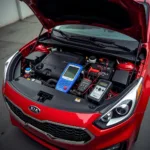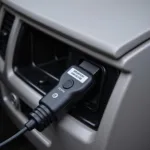As your car warranty nears its expiration date, it’s natural to wonder about the best course of action to keep your vehicle running smoothly without breaking the bank. One question that often comes up is whether to get a full diagnostic check. This comprehensive guide will explore the ins and outs of post-warranty diagnostics, helping you make informed decisions about your car’s maintenance.
Understanding Your Car Warranty
Before delving into the specifics of diagnostic checks, it’s crucial to understand the nuances of your car warranty. Car warranties are essentially contracts between you and the manufacturer, promising to cover specific repairs for a defined period or mileage.
Types of Car Warranties:
- Bumper-to-Bumper Warranty: This typically covers most vehicle components, excluding wear-and-tear items like tires and brake pads.
- Powertrain Warranty: This focuses on the engine, transmission, and other crucial drivetrain components.
- Extended Warranty: An optional coverage extension beyond the original warranty period.
Carefully review your warranty documents to ascertain the covered components, duration, and mileage limitations.
Benefits of a Full Diagnostic Check
A full diagnostic check, as the name suggests, involves a comprehensive inspection of your car’s major systems using advanced scanners and tools. This procedure can uncover hidden problems lurking beneath the surface, even if your car seems to be running fine.
Here are compelling reasons why a full diagnostic check after your warranty ends can be advantageous:
- Early Problem Detection: Identifying issues early can save you significant money on costly repairs down the line.
- Peace of Mind: Knowing the state of your car’s health provides invaluable peace of mind, especially if you plan to keep the vehicle for an extended period.
- Negotiating Power: If you discover issues during the check, you can leverage this information to negotiate better deals on extended warranties or repair costs.
What Does a Full Diagnostic Check Cover?
A comprehensive car diagnostic check typically encompasses the following aspects:
- Engine and Transmission: Checking for error codes, performance issues, and potential problems with sensors, fuel injectors, and other related components.
- Brakes: Inspecting brake pads, rotors, calipers, and fluid levels to ensure optimal stopping power and safety.
- Electrical System: Evaluating the battery, alternator, starter, wiring, and various sensors for proper functionality.
- Exhaust System: Checking for leaks, sensor malfunctions, and catalytic converter efficiency.
- Steering and Suspension: Examining shocks, struts, tie rods, ball joints, and other suspension components for wear and tear.
Is a Full Diagnostic Check Always Necessary?
While a full diagnostic check offers numerous benefits, it might not always be necessary, especially if:
- Your car is relatively new and has low mileage.
- You’ve diligently followed the manufacturer’s recommended maintenance schedule.
- You haven’t noticed any warning signs or unusual behavior from your vehicle.
Factors to Consider When Deciding
 Factors to consider when deciding to get a car diagnostic check
Factors to consider when deciding to get a car diagnostic check
The decision to get a full diagnostic check ultimately depends on your individual circumstances and risk tolerance. Consider these factors:
- Age and Mileage of Your Car: Older, high-mileage vehicles are generally more prone to issues.
- Driving Conditions: Frequent driving in harsh conditions (extreme temperatures, rough terrain) can accelerate wear and tear.
- Budget: Factor in the cost of the diagnostic check and potential repairs.
- Future Plans for the Vehicle: If you plan to sell your car soon, a diagnostic check might be less crucial.
Choosing the Right Diagnostic Service
If you decide to proceed with a full diagnostic check, it’s essential to choose a reputable and trustworthy service provider. Options include:
- Dealerships: Offer specialized knowledge of your car’s make and model but can be more expensive.
- Independent Mechanics: Often more affordable than dealerships and can provide personalized service.
- Auto Repair Chains: Offer convenience and competitive pricing.
Tips for Choosing a Service Provider:
- Check online reviews and ratings.
- Ask for recommendations from friends, family, or online communities.
- Inquire about their experience, certifications, and warranties.
Conclusion
Deciding whether to get a full diagnostic check when your car warranty ends is a personal decision with no one-size-fits-all answer. By carefully considering the factors outlined in this guide, you can make an informed choice that aligns with your budget, risk tolerance, and long-term car ownership goals. Remember, early detection and proactive maintenance are key to prolonging the life of your vehicle and avoiding costly surprises down the road.
FAQs
1. How much does a full car diagnostic check cost?
The cost can range from $50 to $200 or more, depending on your location, the service provider, and the complexity of your car’s systems.
2. Can I perform a basic diagnostic check myself?
While you can purchase inexpensive OBD-II code readers, these devices often provide limited information. A professional check offers a more comprehensive assessment.
3. What should I do if the diagnostic check reveals problems?
Discuss the findings with your mechanic and prioritize repairs based on severity, safety implications, and your budget.
4. Can a diagnostic check detect every potential problem?
While highly effective, diagnostic checks might not identify every issue. However, they significantly increase the likelihood of catching potential problems early on.
5. Is it worth getting a diagnostic check before selling my car?
It can be beneficial to identify any underlying issues and address them proactively, potentially increasing your car’s resale value.
Need Expert Assistance?
If you have further questions or need expert help navigating your car maintenance needs, don’t hesitate to contact us. Our team of certified technicians is available 24/7 to provide personalized guidance and support. You can reach us via WhatsApp: +1(641)206-8880 or Email: [email protected].

